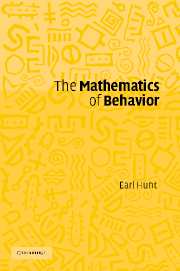Book contents
- Frontmatter
- Contents
- Preface
- 1 INTRODUCTION
- 2 APPLYING PROBABILITY THEORY TO PROBLEMS IN SOCIOLOGY AND PSYCHOLOGY
- 3 FROM PHYSICS TO PERCEPTION
- 4 WHEN SYSTEMS EVOLVE OVER TIME
- 5 NON-LINEAR AND CHAOTIC SYSTEMS
- 6 DEFINING RATIONALITY
- 7 HOW TO EVALUATE EVIDENCE
- 8 MULTIDIMENSIONAL SCALING
- 9 THE MATHEMATICAL MODELS BEHIND PSYCHOLOGICAL TESTING
- 10 HOW TO KNOW YOU ASKED A GOOD QUESTION
- 11 THE CONSTRUCTION OF COMPLEXITY
- 12 CONNECTIONISM
- 13 L'ENVOI
- References
- Index of Names
- Index of Subjects
10 - HOW TO KNOW YOU ASKED A GOOD QUESTION
Published online by Cambridge University Press: 04 May 2010
- Frontmatter
- Contents
- Preface
- 1 INTRODUCTION
- 2 APPLYING PROBABILITY THEORY TO PROBLEMS IN SOCIOLOGY AND PSYCHOLOGY
- 3 FROM PHYSICS TO PERCEPTION
- 4 WHEN SYSTEMS EVOLVE OVER TIME
- 5 NON-LINEAR AND CHAOTIC SYSTEMS
- 6 DEFINING RATIONALITY
- 7 HOW TO EVALUATE EVIDENCE
- 8 MULTIDIMENSIONAL SCALING
- 9 THE MATHEMATICAL MODELS BEHIND PSYCHOLOGICAL TESTING
- 10 HOW TO KNOW YOU ASKED A GOOD QUESTION
- 11 THE CONSTRUCTION OF COMPLEXITY
- 12 CONNECTIONISM
- 13 L'ENVOI
- References
- Index of Names
- Index of Subjects
Summary
THE PROBLEM
Chapter 9 described how psychometricians can uncover the dimensions of ability underlying performance on test batteries, such as the Scholastic Assessment Test, the Armed Services Vocational Battery, and numerous personality tests and employment assessment batteries. In this chapter, we turn our attention to the insides of individual tests within a battery. How is a test to be scored? How do we decide if a question is a good question? To take a concrete example, let us look at the problem of designing a vocabulary test.
Why would we give someone a vocabulary test at all? There are two reasons for doing so.
One is that the person may be applying for a position requiring the use of specialized vocabulary, so knowing the vocabulary is a requirement of the job. For example, in international commercial aviation all radio transmissions between controllers and aircraft are in English, albeit a very reduced version of English. Commercial pilots and air traffic controllers must display an understanding of the vocabulary and rudimentary English syntax of air control messages before receiving their licenses. Physicians and nurses have to know several hundred terms referring to parts of the body. Both these examples refer to situations in which there is an absolute standard of competence. It is easy to design a vocabulary test for this sort of situation; just identify the necessary vocabulary and see if the applicant knows it.
Suppose that instead we want to determine how broad a person's English vocabulary is.
- Type
- Chapter
- Information
- The Mathematics of Behavior , pp. 259 - 276Publisher: Cambridge University PressPrint publication year: 2006



